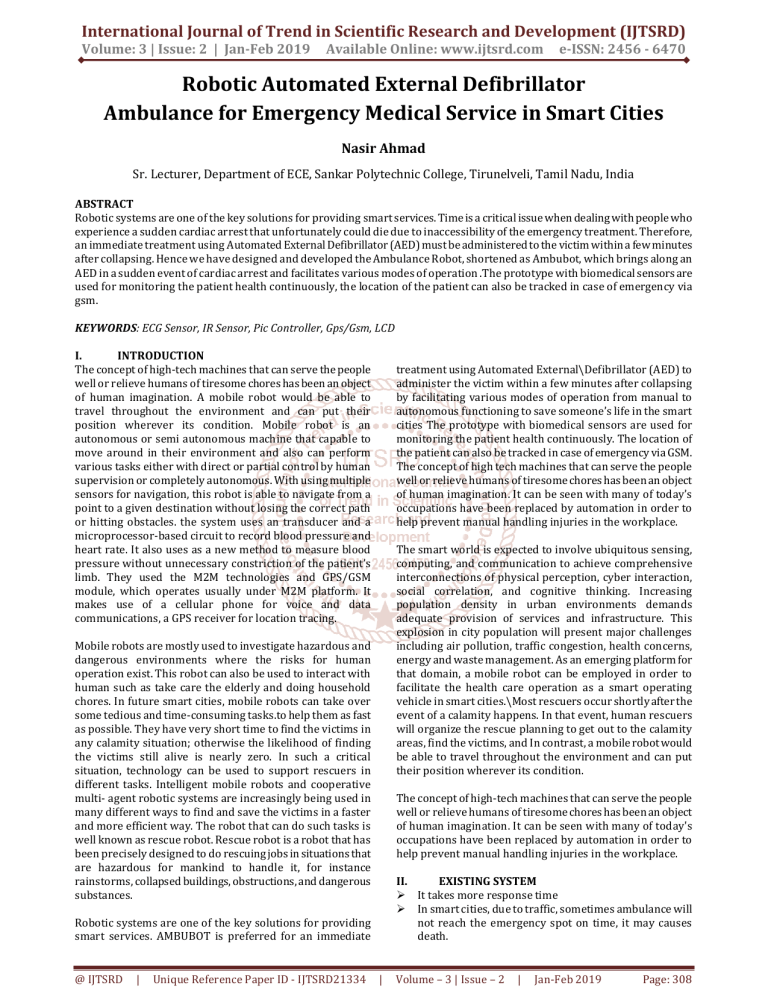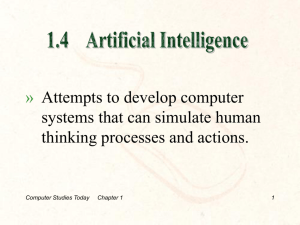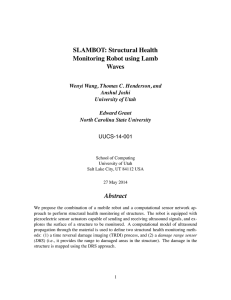
International Journal of Trend in Scientific Research and Development (IJTSRD)
Volume: 3 | Issue: 2 | Jan-Feb 2019
Available Online: www.ijtsrd.com
e-ISSN: 2456 - 6470
Robotic Automated External Defibrillator
Ambulance for Emergency Medical Service in Smart Cities
Nasir Ahmad
Sr. Lecturer, Department of ECE, Sankar Polytechnic College, Tirunelveli, Tamil Nadu, India
ABSTRACT
Robotic systems are one of the key solutions for providing smart services. Time is a critical issue when dealing with people who
experience a sudden cardiac arrest that unfortunately could die due to inaccessibility of the emergency treatment. Therefore,
an immediate treatment using Automated External Defibrillator (AED) must be administered to the victim within a few minutes
after collapsing. Hence we have designed and developed the Ambulance Robot, shortened as Ambubot, which brings along an
AED in a sudden event of cardiac arrest and facilitates various modes of operation .The prototype with biomedical sensors are
used for monitoring the patient health continuously, the location of the patient can also be tracked in case of emergency via
gsm.
KEYWORDS: ECG Sensor, IR Sensor, Pic Controller, Gps/Gsm, LCD
I.
INTRODUCTION
The concept of high-tech machines that can serve the people
well or relieve humans of tiresome chores has been an object
of human imagination. A mobile robot would be able to
travel throughout the environment and can put their
position wherever its condition. Mobile robot is an
autonomous or semi autonomous machine that capable to
move around in their environment and also can perform
various tasks either with direct or partial control by human
supervision or completely autonomous. With using multiple
sensors for navigation, this robot is able to navigate from a
point to a given destination without losing the correct path
or hitting obstacles. the system uses an transducer and a
microprocessor-based circuit to record blood pressure and
heart rate. It also uses as a new method to measure blood
pressure without unnecessary constriction of the patient’s
limb. They used the M2M technologies and GPS/GSM
module, which operates usually under M2M platform. It
makes use of a cellular phone for voice and data
communications, a GPS receiver for location tracing.
treatment using Automated External\Defibrillator (AED) to
administer the victim within a few minutes after collapsing
by facilitating various modes of operation from manual to
autonomous functioning to save someone’s life in the smart
cities The prototype with biomedical sensors are used for
monitoring the patient health continuously. The location of
the patient can also be tracked in case of emergency via GSM.
The concept of high tech machines that can serve the people
well or relieve humans of tiresome chores has been an object
of human imagination. It can be seen with many of today’s
occupations have been replaced by automation in order to
help prevent manual handling injuries in the workplace.
The smart world is expected to involve ubiquitous sensing,
computing, and communication to achieve comprehensive
interconnections of physical perception, cyber interaction,
social correlation, and cognitive thinking. Increasing
population density in urban environments demands
adequate provision of services and infrastructure. This
explosion in city population will present major challenges
including air pollution, traffic congestion, health concerns,
energy and waste management. As an emerging platform for
that domain, a mobile robot can be employed in order to
facilitate the health care operation as a smart operating
vehicle in smart cities.\Most rescuers occur shortly after the
event of a calamity happens. In that event, human rescuers
will organize the rescue planning to get out to the calamity
areas, find the victims, and In contrast, a mobile robot would
be able to travel throughout the environment and can put
their position wherever its condition.
Mobile robots are mostly used to investigate hazardous and
dangerous environments where the risks for human
operation exist. This robot can also be used to interact with
human such as take care the elderly and doing household
chores. In future smart cities, mobile robots can take over
some tedious and time-consuming tasks.to help them as fast
as possible. They have very short time to find the victims in
any calamity situation; otherwise the likelihood of finding
the victims still alive is nearly zero. In such a critical
situation, technology can be used to support rescuers in
different tasks. Intelligent mobile robots and cooperative
multi- agent robotic systems are increasingly being used in
many different ways to find and save the victims in a faster
and more efficient way. The robot that can do such tasks is
well known as rescue robot. Rescue robot is a robot that has
been precisely designed to do rescuing jobs in situations that
are hazardous for mankind to handle it, for instance
rainstorms, collapsed buildings, obstructions, and dangerous
substances.
The concept of high-tech machines that can serve the people
well or relieve humans of tiresome chores has been an object
of human imagination. It can be seen with many of today's
occupations have been replaced by automation in order to
help prevent manual handling injuries in the workplace.
EXISTING SYSTEM
II.
It takes more response time
In smart cities, due to traffic, sometimes ambulance will
not reach the emergency spot on time, it may causes
death.
Robotic systems are one of the key solutions for providing
smart services. AMBUBOT is preferred for an immediate
@ IJTSRD
|
Unique Reference Paper ID - IJTSRD21334
|
Volume – 3 | Issue – 2
|
Jan-Feb 2019
Page: 308
International Journal of Trend in Scientific Research and Development (IJTSRD) @ www.ijtsrd.com eISSN: 2456-6470
Finland in December 1991.[2] As of 2014, it has become the
global standard for mobile communications – with over 90%
market share, operating in over 193 countries and territories
To overcome these problems, Ambulance robot is used.
III.
PROPOSED SYSTEM
The proposed ambulance robot for smart cities provides
the service of ambulance with AED to help someone
having a cardiac arrest.
No need to wait for the ambulance to give first aid
solutions.
An emergency message and current position of victim
will be generated
Also, message can be sent to the family members
regarding current situation of the victim.
It performs time-consuming tasks.
It can be operated in auto or manual mode.
IV.
GPS
A GPS navigation device, GPS receiver, or simply GPS is a
device that is capable of receiving information from GPS
satellites and then to calculate the device's geographical
position. Using suitable software, the device may display the
position on a map, and it may offer directions. The Global
Positioning System (GPS) is a global navigation satellite
system (GNSS) made up of a network of a minimum of 24,
but currently 30, satellites placed into orbit by the U.S.
Department of Defense.
BLOCK DIAGRAM
RELAY
A relay is a electromagnetic switch, It is used in application
to turn on and of a circuit by low power signal 24V, or
several circuits must be controlled by one signal.
ROBOT
A robot is a machine—especially one programmable by a
computer— capable of carrying out a complex series of
actions automatically.[2] Robots can be guided by an
external control device or the control may be embedded
within. Robots may be constructed to take on human form
but most robots are machines designed to perform a task
with no regard to how they look.
POWER SUPPLY
A power supply is an electrical device that supplies electric
power to an electrical load. The primary function of a power
supply is to convert electric current from a source to the
correct voltage, current, and frequency to power the load.
V.
IR SENSOR
An infrared sensor is an electronic device, that emits in order
to sense some aspects of the surroundings. An IR sensor can
measure the heat of an object as well as detects the motion.
These types of sensors measures only infrared radiation,
rather than emitting it that is called as a passive IR sensor.
HARADWARE REQUIREMENTS
ATMEL MICROCONTROLLER
ECG SENSOR
HEART BEAT SENSOR
IR SENSOR
GSM
GPS
RELAY
ROBO
LCD
HEART BEAT SENSOR
The heartbeat sensor is based on the principle of photo
phlethysmography. ... The flow of blood volume is decided by
the rate of heart pulses and since light is absorbed by blood,
the signal pulses are equivalent to the heart beat pulses.
LCD
LCD (liquid crystal display) is the technology used for
displays in notebook and other smaller computers. Like
light-emitting diode (LED) and gas-plasma technologies,
LCDs allow displays to be much thinner than cathode ray
tube (CRT) technology. LCDs consume much less power than
LED and gas-display displays because they work on the
principle of blocking light rather than emitting it.
ADC
In electronics, an analog-to-digital converter (ADC, A/D, or
A-to-D) is a system that converts an analog signal, such as a
sound picked up by a microphone or light entering a digital
camera, into a digital signal. An ADC may also provide an
isolated measurement such as an electronic device that
converts an input analog voltage or current to a digital
number representing the magnitude of the voltage or
current. Typically the digital output is a two's complement
binary number that is proportional to the input, but there
are other possibilities.
GSM
GSM (Global System for Mobile communications) is a
standard developed by the European Telecommunications
Standards Institute (ETSI) to describe the protocols for
second-generation (2G) digital cellular networks used by
mobile devices such as tablets. It was first deployed in
ATMEL MICRO CONTROLLER
AVR is a family of microcontrollers developed since 1996 by
Atmel, acquired by Microchip Technology in 2016. These are
modified Harvard architecture 8-bit RISC single-chip
microcontrollers. AVR was one of the first microcontroller
families to use on-chip flash memory for program storage, as
@ IJTSRD
|
Unique Reference Paper ID - IJTSRD21334
|
Volume – 3 | Issue – 2
|
Jan-Feb 2019
Page: 309
International Journal of Trend in Scientific Research and Development (IJTSRD) @ www.ijtsrd.com eISSN: 2456-6470
opposed to one-time programmable ROM, EPROM, or
EEPROM used by other microcontrollers at the time.
are still on the investigation step to guarantee safe and
reliable operation
ECG SENSOR
The Shimmer ECG (Electrocardiogram) sensor records the
pathway of electrical impulses through the heart muscle, and
can be recorded on resting and ambulatory subjects, or
during exercise to provide information on the heart's
response to physical exertion.
REFERENCES
[1] H. Ning et al., “From Internet to smart world,” IEEE
Access, vol. 3, pp. 1994-1999, Oct. 2015.
[2] R. Jalali, K. El-khatib, and C. McGregor, “Smart city
architecture for community level services through the
Internet of Things,” in Proc. IEEE 18th Int. Conf. Intell.
Next Generat. Netw. (ICIN), Feb. 2015, pp. 108-113
VI.
SOFTWARE REQUIREMENTS
KEIL UVISION
EMBEDDED C
[3] M. Arif, H. Samani, C.-Y. Yang, and Y.-Y. Chen,
“Adaptation of mobile robots to intelligent vehicles,” in
Software Engineering and Service Science (ICSESS),
2013 4th IEEE International Conference on. IEEE,2013.
EMBEDDED C
Embedded C is an extension to C programming language that
provides support for developing efficient programs
for embedded devices. It is not a part of the C language.
[4] F. Matsuno and S. Tadokoro, “Rescue robots and
systems in japan,” in Robotics and Biomimetics, 2004.
ROBIO 2004. IEEE International Conference on. IEEE,
2004. [5] C.-P. Lam, C.-T. Chou, K.-H. Chiang and L.-C.
Fu, “Human-centered robot navigation towards a
harmoniously human–robot coexisting environment,
”Robotics, IEEE Transactions on, vol. 27, no. 1, pp. 99–
112, 2011.
VII.
CONCLUSION
In this paper, we presented a usage of smart vehicle for
smart city which can be implemented to intelligent vehicles
based on their architecture using a simple sequence of three
steps: sense, plan, and act (SPA). Some of that technology has
readily available on the market today and the rest of them
@ IJTSRD
|
Unique Reference Paper ID - IJTSRD21334
|
Volume – 3 | Issue – 2
|
Jan-Feb 2019
Page: 310



